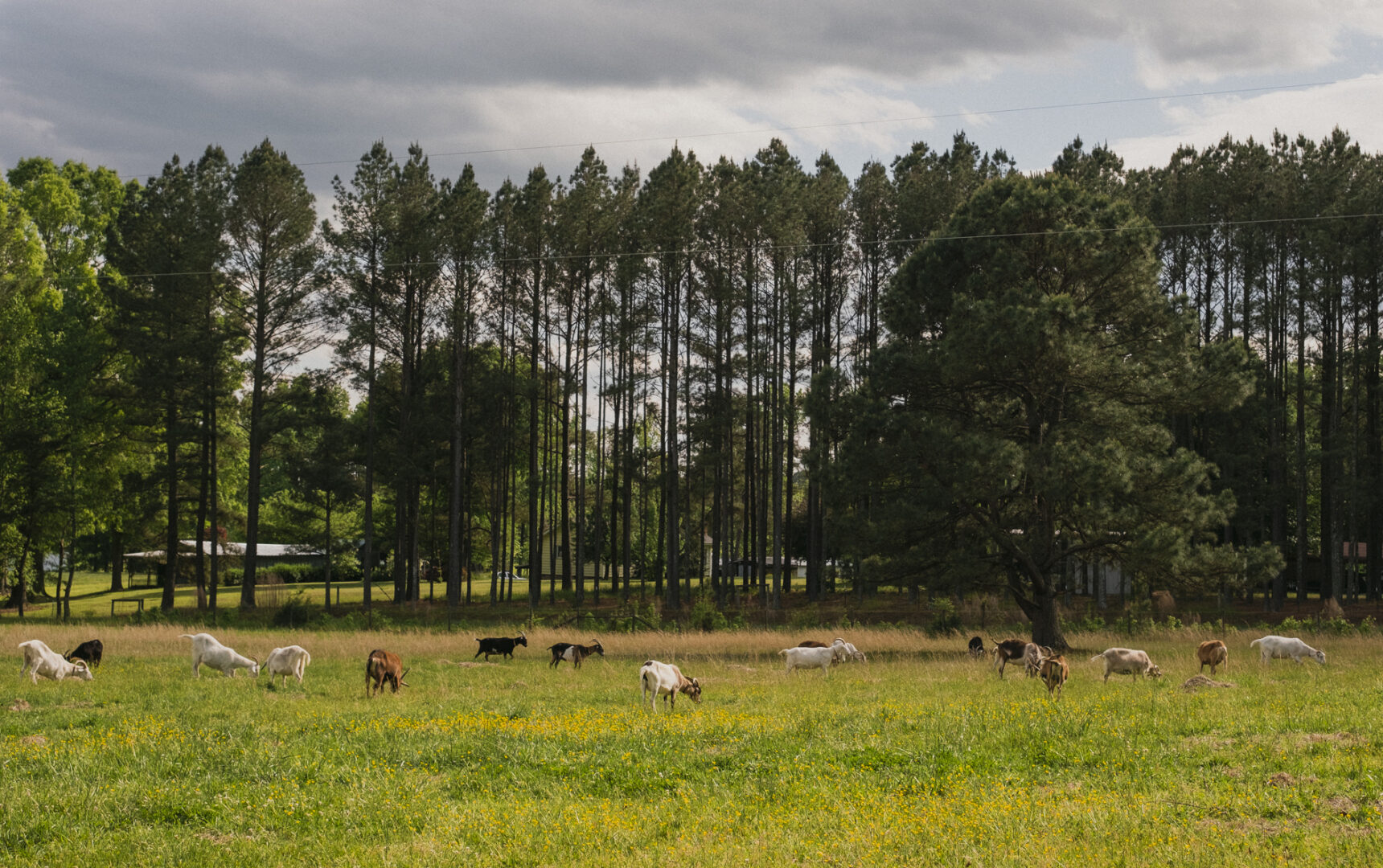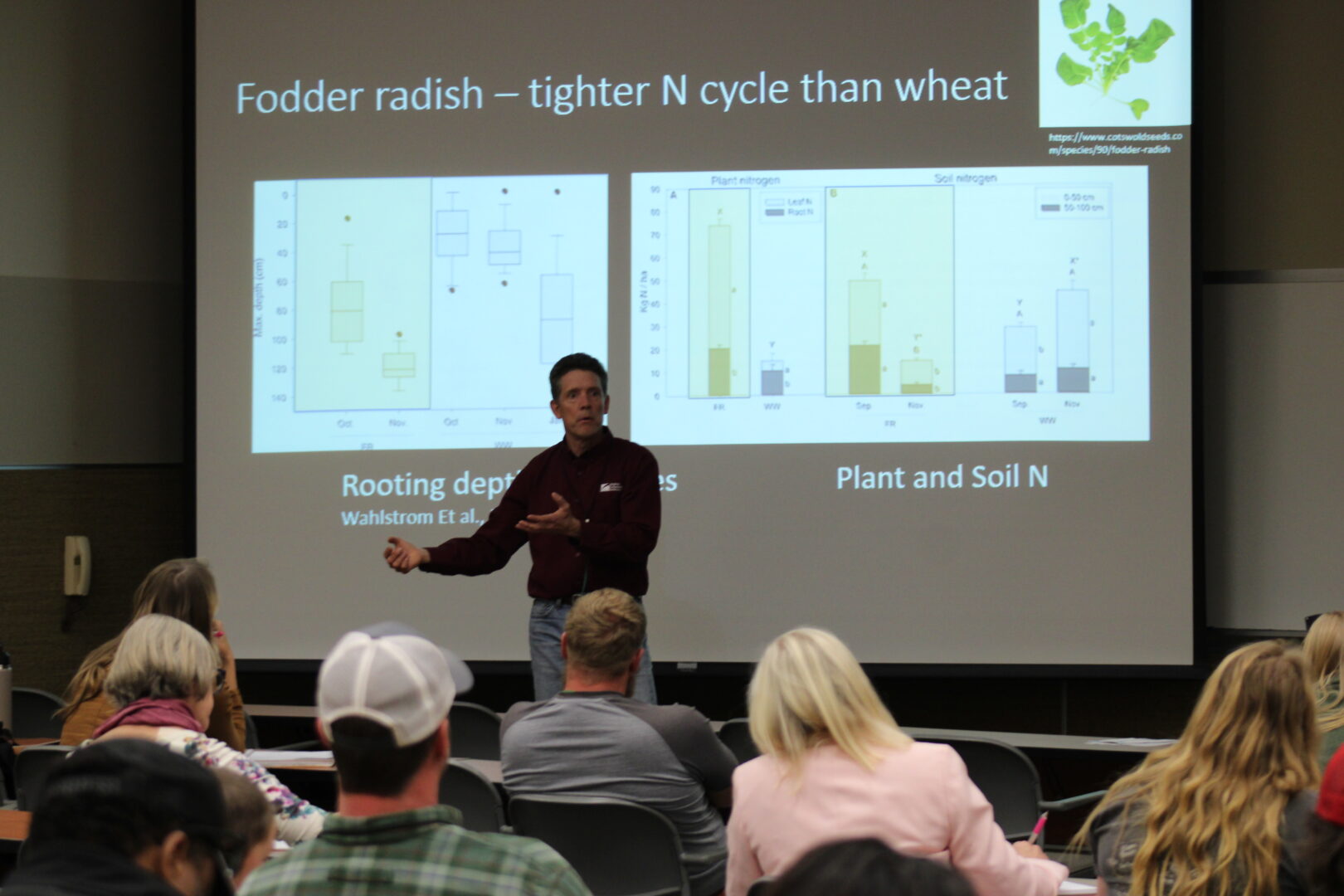What to Expect
The Organic Commodities and Livestock Conference is a one-day conference of in-person programming each winter in North Carolina. Sessions are taught by farmers, researchers, Extension specialists, and industry leaders from across the state.
Our list of talented speakers provide practical and innovative information through educational workshops, panel discussions, inspiring talks, and hands-on demos.
Here’s what’s in store for this year.
Keynote Lunch
Carrie & Erin Martin, Footprints in the Garden
6th & 7th Generation Farmers in Wayne County, North Carolina
We’re fortunate to have two Mount Olive locals deliver the keynote at this year’s conference. Carrie and Erin Martin, the mother-daughter duo of Footprints in the Garden (an eighth-generation family farm established in 1883), will talk about their family’s agricultural legacy and land ethic, tackling food insecurity in their community and surrounding areas and inspiring future generations to take active roles in farming.
About the Speakers
Carrie Martin has worked for more than 20 years on her family’s Wayne County farm and is the director of agriculture and conservation at the Black Family Land Trust. Carrie’s many roles there involve assisting families with navigating heirs’ property, assisting families with wealth retention and asset protection, and implementing risk management tools. Carrie’s passion is engaging small acreage farms by conducting education workshops on agritourism, farm infrastructure development, and land ethic storytelling and creation.
Erin Martin is the outreach coordinator for Fertile Ground Food Cooperative, which provides local agriculture products to food hubs, farmers, farmers markets, individuals, and retailers throughout North Carolina. Erin has worked in agriculture for most of her life alongside her mother, Carrie, on the family farm. She is responsible for the day-to-day operations, including the farm’s aggregation center, where she collaborates with more than 12 local farms and the University of Mount Olive. A self-proclaimed “food desert fighter,” Erin’s work with Fertile Ground Food Cooperative allows her to work with local Black-owned food cooperatives to provide local, fresh, and affordable produce to neighborhoods that are in underserved areas.
In October 2023, Sand County Foundation awarded Erin the Carolinas Leopold Conservation Award, acknowledging land stewards who inspire others with their dedication to land, water, wildlife habitat, and conservation measures.
Sessions
Forage Management for Year-Round Grazing
Dr. Heather Glennon, University of Mount Olive & Tim Jones, Clifton Seed Company
With a well-designed management plan, producers can set up a grazing system allowing ruminants to forage year-round, benefiting animal nutrition, increasing pasture productivity, and reducing feeding costs. Heather covers strategies for year-round grazing, including planting winter annuals to replace feeding hay in the colder months, planning for the summer slump using warm-season grasses, adding legumes for higher protein, and using lespedeza as a natural dewormer. The session concludes outside on the student farm, where participants will see examples of a forage mix planted for the UMO ruminants.
Lambing and Kidding Health
Dr. Heather Glennon, University of Mount Olive
On-farm lambing and kidding deliver some of the greatest delights for sheep and goat producers while presenting them with unique challenges regarding animal health. As spring approaches, with ewes and does ready to drop, Heather reviews essential considerations for producers, including pasture versus barn lambing, determining when and how interventions are needed, and bottle lamb/kid management. The session wraps up outside, with the newly born lambs and kids on the UMO student farm.
Hands-On Demo: Mechanization for Scaling Up Vegetable Production
Dan Pipkin & Dr. Jason Davis, University of Mount Olive
Farmers looking to scale up production or add efficiency to their operation must weigh equipment costs with the time and labor saved with mechanization. Join Dan and Jason outside for a hands-on session demonstrating two pieces of equipment – a plastic mulch layer and a waterwheel transplanter – setting up and using the equipment in the field and reviewing the advantages and disadvantages of each. Participants can try it out for themselves, shaping beds, laying down plastic, and riding on the transplanter to sow cabbage and potatoes.
Organic & Non-GMO Grain Roundtable
Melinda Fitzgerald, Country Farm & Home; Jeff Bender, Bender Farms; George Teague, Reedy Fork Farm; Billy Carter, Carter Farms; Hannah Moshay, NC State University
Panelists discuss the evolving landscape of organic and non-GMO livestock feed grain from the point of view of producers and feed distributors in North Carolina. Hannah facilitates a lively discussion about the challenges and opportunities within this specialty market and how grain producers, feed distributors, and livestock farmers can successfully navigate changing consumer demands, such as soy-free preferences. Attendees are encouraged to bring questions and their experiences to share with the group.
Soil Health Resources: Cover Crop Selector Tools and a Farmer-Driven Coalition
Dr. Chris Reberg-Horton & Esleyther Henriquez Inoa, NC State University; Karen Scalf, NC Soil Health Coalition & KHFarms
Chris and Esleyther lead an interactive session on new online tools to help producers optimize cover crops, from a species selector tool to a nitrogen calculator. These new platforms can help producers find success with cover crops that fit the needs of their operations. Karen discusses the work of the newly established NC Soil Health Coalition, a farmer-led nonprofit that provides education, mentorship, and support among North Carolina’s farmers to foster the adoption of soil health practices.
Building a Regional Fiber Economy
Courtney Lockemer, Piedmont Fibershed
We know the importance of locally-grown food, but what about locally-grown clothing and textiles? Courtney discusses why and how to build a regional fiber and textile economy in the Carolinas by increasing processing capacity, expanding end markets, and creating opportunities for small-scale farmers, from livestock to hemp. She reviews the current state of fiber farming and the work by nonprofits such as Piedmont Fibershed to expand the local textile economy.
Digging Deep into Soil Monoliths
Dr. Scott Tilley, University of Mount Olive
Soil monoliths provide a detailed visual of how the different layers, or horizons, form a soil profile, each telling a story about its life and health. In the first portion of this session, Dr. Tilley explains the process of extracting and building a soil monolith for educational purposes and how they are used to compare the different horizons. Using a monolith as a visual, he discusses the fundamentals of the A horizon, what we can learn about its properties, and management strategies that help build healthy soils. For the latter half, the class moves outside to the farm to examine how soils vary across the same landscape.
Organic Disease & Weed Management in Corn & Tobacco
Marcus Williams, Carolina Farm Stewardship Association; Hannah Moshay, Daisy Ahumada, & Charles Cahoon, NC State University
Daisy Ahumada will discuss diseases associated with corn and tobacco, highlighting key symptoms, prevention measures, and treatment options. To follow, Charles Cahoon examines weed management solutions in corn, discussing practical strategies for controlling weeds and presenting innovative and sustainable weed management solutions for corn producers. To conclude, Hannah Moshay offers an interactive way for attendees to apply the knowledge they have gained throughout the session.
Agroforestry Design: Improving Resilience & Profits
Harry Greene, Propagate
Join Harry Greene for an interactive discussion on agroforestry, including specific practices such as alley cropping, silvopasture, windbreaks, and riparian buffers, and which of these practices are a win-win for economic and ecological outcomes. Attendees will gain an understanding of what is possible on their land and choosing the right trees for individual goals; how to estimate profit potential, implementation cost, and labor and equipment needed; and what financing solutions exist, both public and private, to assist in establishing an agroforestry project.
Enterprise Budgets for Organic Producers
Derek Washburn, NC State University
Enterprise budgets are essential in helping organic producers decide what crops to grow, how much to grow, and how to allocate their resources to meet production goals. Derek covers record-keeping basics needed for utilizing budget tools accessible through NCSU and CFSA and provides a brief overview of those tools along with a step-by-step practical guide on how to use your numbers to model farm costs and returns.
Technical, Financial, and Adaptation Resources for Climate-Smart Agriculture
Kim Butz, Carolina Farm Stewardship Association & Amit Chandramouly, USDA Southeast Climate Hub
Working farms are under threat from climate change and variability, but there are several programs and resources available to support producers in the Southeast to manage risk and implement mitigation strategies. Kim Butz discusses climate-smart farming practices and two new opportunities for growers in the Carolinas: Rodale Institute’s Southern Piedmont Climate-Smart Project and the Pasa Climate-Smart Farming & Marketing Program. Amit Chandramouly introduces the USDA’s Southeast Regional Climate Hub’s tools and resources for adaptive management strategies for challenges associated with drought, heat stress, excessive moisture, and changes in pest pressures.
Marketing Niche Meats & Building Your Brand
Ron Simmons, Master Blend Family Farms
Niche meat producers rely on superior quality, social attributes, and environmental benefits for market differentiation. However, they face added challenges in marketing and selling their products, which require a different skill set than raising, managing, and processing animals. Master Blend Family Farms has produced high-quality pastured pork since 2012, successfully building its brand around providing premium meat with the highest animal welfare and environmental stewardship standards. Owner and farmer Ron Simmons discusses how he has succeeded in the niche meat industry by addressing marketing challenges, thinking creatively, developing strategies that allow for multiple revenue streams, and building a connection with the community to stand out in the pork industry.
Utilizing Agronomic Services for Organic Producers
Kristin Hicks, NCDA & Stephanie Kulezsa, NC State University
As organic producers working to minimize inputs and work in harmony with the natural environment, it is even more critical to understand plant nutrition and soil health on a micro level. The NC Department of Agriculture provides agronomic lab services to help growers make targeted decisions on correcting deficiencies and addressing crop fertility based on samples from individual farms. In this session, Kristin discusses plant tissue and compost analysis, when to take samples, and how to interpret results. Stephanie covers the nutrient content and fertility of different sources of manure and the importance of waste analysis for organic producers.
Don’t miss this year’s lineup!
The Organic Commodities and Livestock Conference centers certified organic commodities, commercial-scale specialty crops, and pasture-based livestock.
The conference is a full day of educational sessions, research updates, panel discussions, and networking.



